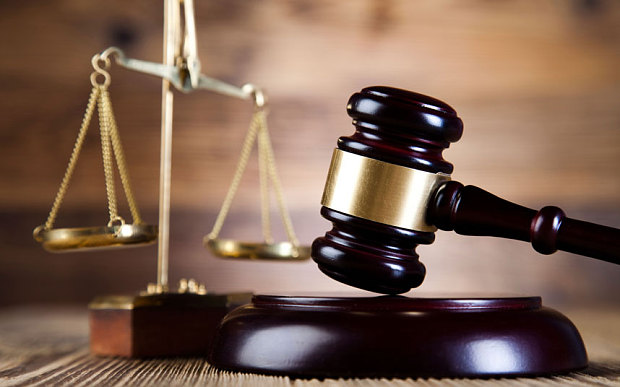The ECOWAS Court has ordered the Federal Republic of Nigeria to carry out an effective prosecution and issue a punishment to one Peter Okoro who has been held if found guilty of sexual abuse on his alleged victim.
This was after the ECOWAS Court panel of three presided over by Justice Edward Amoako Asante declared that, the Respondent (Federal Republic of Nigeria) is in violation of the Applicant’s (rape victim) right to fair trial under Article 7(1) (a) of the African Charter by virtue of its failure to conduct a speedy and effective trial against the perpetrator of the sexual violence suffered by the Applicant.
The external ECOWAS Court session currently ongoing in Ghana, is hearing some 60 cases of which 25 judgements would be delivered in a 10-day Court hearings.
The Court held that, the tenets of fair hearing include consideration of the length of trial and the reasonableness of the length to determine if justice has been delayed beyond measure to occasion the violation of the right to fair trial. In the instant suit, both parties are agreeable that the perpetrator of the alleged rape is before court.
The case is said to have happend in 2011 and has suffered several adjournments after the victim had testified in 2013.
The panel which also includes Justice Dupe Atoki and Justice Januaria T.S Moreira Costa ordered the Respondents to submit to the Court within six months
of the date of the notification of this Judgment, a report on the measures
taken to implement the orders set-forth herein.
“After a careful consideration of this issue, the Court comes to an irresistible conclusion that, over ten years of prosecution in which the Respondent State is yet to deliver judgment is unreasonable and violates the principle of fair
trial and fortiori the right of the Applicant to the right to have her cause heard and the Court so hold.’
Subject matter
The Applicant, who is a rape victim (name withheld) claims that she was violently raped by one Peter Okoro on August 20, 2011 at Olokonla Area of Lagos State, Nigeria at the age of 17 years.
According to her, after the rape, she was taken to the Lagos State
General Hospital, Ibeju Lekki where she was admitted for four days while undergoing treatment.
The victim contended that, the Medical Report by the hospital showed that her vaginal canal was free and open, her hymen broken into and disappeared, and there was mild bleeding.
It is the case of the Applicant that she eventually reported the rape at the Ajiwe Police Station in Ajah, Lagos State, Nigeria.
After police investigations, the suspected rape perpetrator was charged with the offences of rape and unlawful assault and arraigned before the Lagos State Magistrate Court, Ajah Division on September 8, 2011 where he pleaded not
guilty to the charges.
The Applicant states that she finished her oral testimony in the case by March 29, 2012. However, the trial has suffered various adjournments till date.
The Accused person was last present at the Court on 7th January 2013 and has not been produced in court even though he is in prison custody.
The Applicant states that the Prosecution has not called the other witnesses to enable the Accused open his defence, and the trial is stalled, leaving the Applicant without a remedy, more than seven years after she suffered the rape.
The Applicant further claims that the case was filed before a Court lacking jurisdiction in respect of the offence of rape. The case was filed before a
Magistrate Court rather than a High Court which has the exclusive jurisdiction to try the offence of rape.
The Applicant contends that by virtue of the above facts, the Respondent is legally responsible for violation of her right to dignity, to a fair hearing, to remedy, freedom from cruel, inhuman or degrading treatment, freedom from discrimination as guaranteed under the relevant human right instruments, particularly the African Charter on Human and Peoples’ Rights (African
Charter).
Reliefs sought
The Applicant seeks the following reliefs from the Court:
i. A declaration that the Federal Republic of Nigeria has violated the
right of Ekundayo Idris to a fair hearing pursuant to article 7(1)(a) of theAfrican Charter on Human and Peoples’ Rights, article 25 of the Maputo Protocol, and article 14 (1) of the International Covenant on Civil and Political Rights.
ii. A declaration that the Federal Republic of Nigeria has violated the
right of Ekundayo Idris to a remedy pursuant to articles 1 and 7(1)(a) of the African Charter on Human and Peoples’ Rights, article 2(3) of the
International Covenant on Civil and Political Rights, and article 25 of the
Maputo Protocol.
iii. A decoration the Federal Republic of Nigeria is responsible for a violation of the right of Ekundayo Idris to freedom from discrimination
pursuant to article 2 of the African Charter on Human and Peoples’ Rights, articles 2, 3(4) and 4(2) of the Maputo Protocol, article 2(1) of the
International Covenant on Civil and Political Rights and articles 1 and 2 of the Convention on the Elimination of all Forms of Discrimination against Women.
iv. A declaration that the Federal Republic of Nigeria is responsible for
violation of her rights to dignity, and to freedom from cruel, inhuman or
degrading treatment pursuant to article 5 of the African Charter on Human and Peoples Rights, article 3 of the Maputo Protocol and article 7 of the International Covenant on Civil and Political Rights.
v. An order of damages in the sum of Twenty-five Million Naira to
compensate Ekundayo Idris for the physical and psychological pain,
emotional distress and post- traumatic stress
vi. An order directing the Federal Republic of Nigeria to carry out an
effective prosecution and punishment of the perpetrator of the sexual abuse suffered by Ekundayo Idris.
vii. Any such further order or orders as the Court deems fit in the
circumstances.
Respondents’ case’
In its defence, the Respondent states that none of the officials or personnel or staff of any of its institutions or agencies had prior knowledge of the incident of rape of the Applicant until when she was brought to and immediately admitted and treated at Lagos State General Hospital, Ijebu, Lekki, Lagos.
The Respondent admitted the averment of the Applicant to the extent that she was admitted in the Lagos State General Hospital first and subsequently reported a case of allegation of rape against her by one Peter Okoro at a police station in Lagos and upon investigations, the suspect was arrested and
arraigned.
The Respondent also contended that the Police promptly charged the accused with the offence of rape and arraigned him before a trial magistrate court of the Lagos State where the case is still pending.
The Respondent further states that once a case is filed before its courts, the discretion of the court in the conduct of its proceedings is not usually disturbed by any other institution/organ of the Respondent until at the conclusion of thecase whereby an aggrieved or dissatisfied party may exercise his/her right to
appeal.
The respondent argued that, cases before the Respondent’s court whether criminal or civil are
sometimes affected by either the transfer, retirement, elevation, removal or death of a trial judge of the particular case involved with the attendant consequences of commencing the case afresh.
According to the Respondent, Peter Okoro is being prosecuted and there was the need to await the outcome of the prosecution at the court aforementioned and upon being found guilty, the court will surely convict and sentence the
Accused person in accordance with the law and assuage or propitiate the Applicant.
It is the case of the Respondent that the State cannot be accused of deliberate violation of the right of the Applicant to fair trial on account of the non conclusion of the pending case against the alleged perpetrator of the crime.
The Respondent contends that it has not violated any of the fundamental human rights of the Applicant known to law and it will be in the interest of
justice to reject the case as inadmissible, having regard to the pendency of the criminal case against the perpetrator of the crime against the Applicant.
By court
The court after assessing the merit declares that, the Respondent is not in violation Applicant’s rights to
dignity, and to freedom from cruel, inhuman or degrading treatment
under Article 5 of the African Charter;
The court also declares that, the Respondent’s failure to conduct a speedy and effective trial against the perpetrator of the sexual violence suffered by Applicant did not legally violate her rights to freedom from
discrimination under Article 2 of the African Charter;
It also declares that the Respondent’s failure to conduct a speedy and
effective trial against the perpetrator of the sexual violence suffered by
Applicant did not legally violate her rights to remedy – obligation to
investigate and arrest under Article 1 of the African Charter;
“Declares that the Respondent is in violation of the Applicant’s right to fair trial under Article 7(1) (a) of the African Charter by virtue of its
failure to conduct a speedy and effective trial against the perpetrator of the sexual violence suffered by the Applicant.
“Dismisses the Applicant’s prayer for damages.
“Orders the Respondent to carry out an effective prosecution and, if
found guilty punishment of the perpetrator of the sexual abuse on the Applicant.
“Orders the parties to bear their respective costs.”
Source: Ghana/Starrfm.com.gh/Murtala Inusah




